Atopomyrmex mocquerysi André
  Type location Senegal (Atopomyrmex Mocquerysi nov. sp.,
André,
1889: 227, worker; André, 1895a: 3, queen; Forel, 1913b: 335, male),
from Dakar, collector A. Mocquerys Type location Senegal (Atopomyrmex Mocquerysi nov. sp.,
André,
1889: 227, worker; André, 1895a: 3, queen; Forel, 1913b: 335, male),
from Dakar, collector A. Mocquerys
junior synonyms
arnoldi
(Atopomyrmex Mocquerysi André
var. Arnoldi
n. var., Santschi, 1923e: 283, worker) from Zaïre, Eala, Mayné
- see http://www.antweb.org/specimenImages.do?name=casent0912872
erigens (Atopomyrmex
mocquerysi André var. erigens
n. var.Santschi, 1924b:
205, worker) from Zaïre, Yambala, De Giorgi - see http://www.antweb.org/specimenImages.do?name=casent0912874
australis (Atopomyrmex
mocquerysi André var. australis
n. var., Santschi, 1914e:
16, worker) from South Africa,
Zuluand - see http://www.antweb.org/specimenImages.do?name=casent0912873
obscura (Atopomyrmex
Mocquerysi André var. obscura
n. var., Santschi,
1923e: 283, worker) from Ivory Coast, at Jacqueville, by
Lohier - see http://www.antweb.org/specimenImages.do?name=casent0912875
opaca (Atopomyrmex
Mocquerysi André stirps opaca
n. st., Santschi, 1923e: 283, worker) from Angola, Kubanga,
vii.1913 - see http://www.antweb.org/specimenImages.do?name=casent0912876
unavailable name nigellus (Atopomyrmex
Mocquerysi André stirps opacus
Santschi v. nigellus n. var.,
Santschi, 1930b: 72, worker) from Angola, Rio Mbale - see http://www.antweb.org/specimenImages.do?name=casent0912877
(see Bolton, 1995)  . .
|
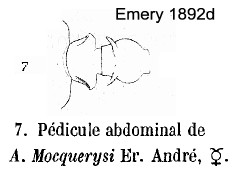 André's
(1889) description is at André's
(1889) description is at  . Forel's (1912b)
description of the queen
and male is at . Forel's (1912b)
description of the queen
and male is at  . Santschi's (1914e)
description of australis is at . Santschi's (1914e)
description of australis is at  . Arnold (1916: 190) gave a translation of
of what he denoted as curvispina but as a variety of mocquerysi,
which it clearly is (as was recognised by Santschi, 1925h, in a
footnote to his key, see above for card, and re-designated as arnoldi)
and notes, these are at . Arnold (1916: 190) gave a translation of
of what he denoted as curvispina but as a variety of mocquerysi,
which it clearly is (as was recognised by Santschi, 1925h, in a
footnote to his key, see above for card, and re-designated as arnoldi)
and notes, these are at  and and  . Santschi's (1923e) descriptions of obscura,
arnoldi and opaca are at . Santschi's (1923e) descriptions of obscura,
arnoldi and opaca are at  . Santschi's (1924b) description of erigens
is at . Santschi's (1924b) description of erigens
is at  . Santschi's (1925h)
description of opacus (sic) is at . Santschi's (1925h)
description of opacus (sic) is at  . Santschi's
(1925h)
key is at . Santschi's
(1925h)
key is at  . Santschi's
(1930b)
description of nigellus is at . Santschi's
(1930b)
description of nigellus is at  Bolton's (1981b) modern re-description is
at
Bolton's (1981b) modern re-description is
at  . .
|
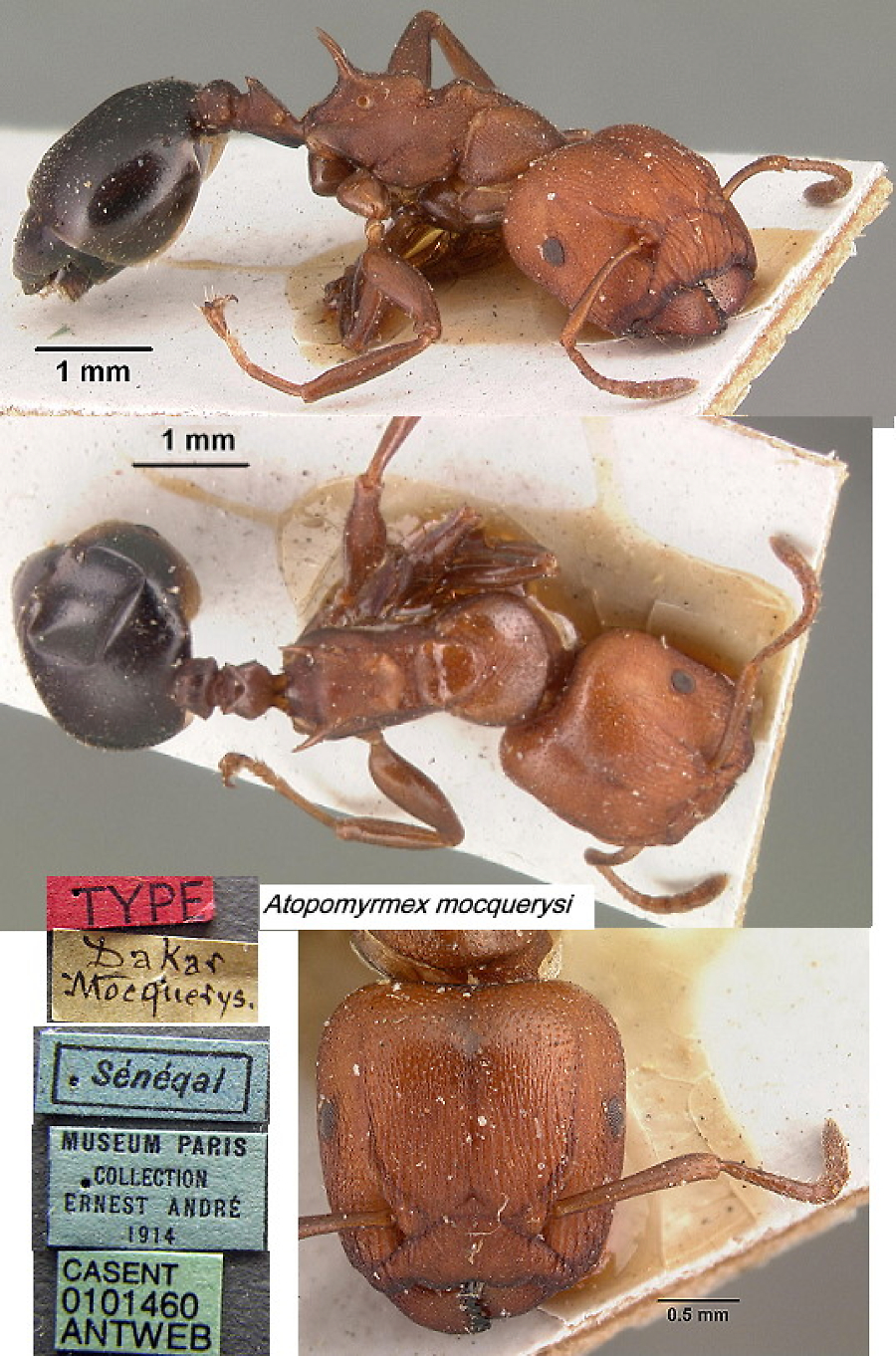 The
photomontage of the holotype is collated from http://www.antweb.org/specimen.do?name=casent0101460. The
photomontage of the holotype is collated from http://www.antweb.org/specimen.do?name=casent0101460.
|
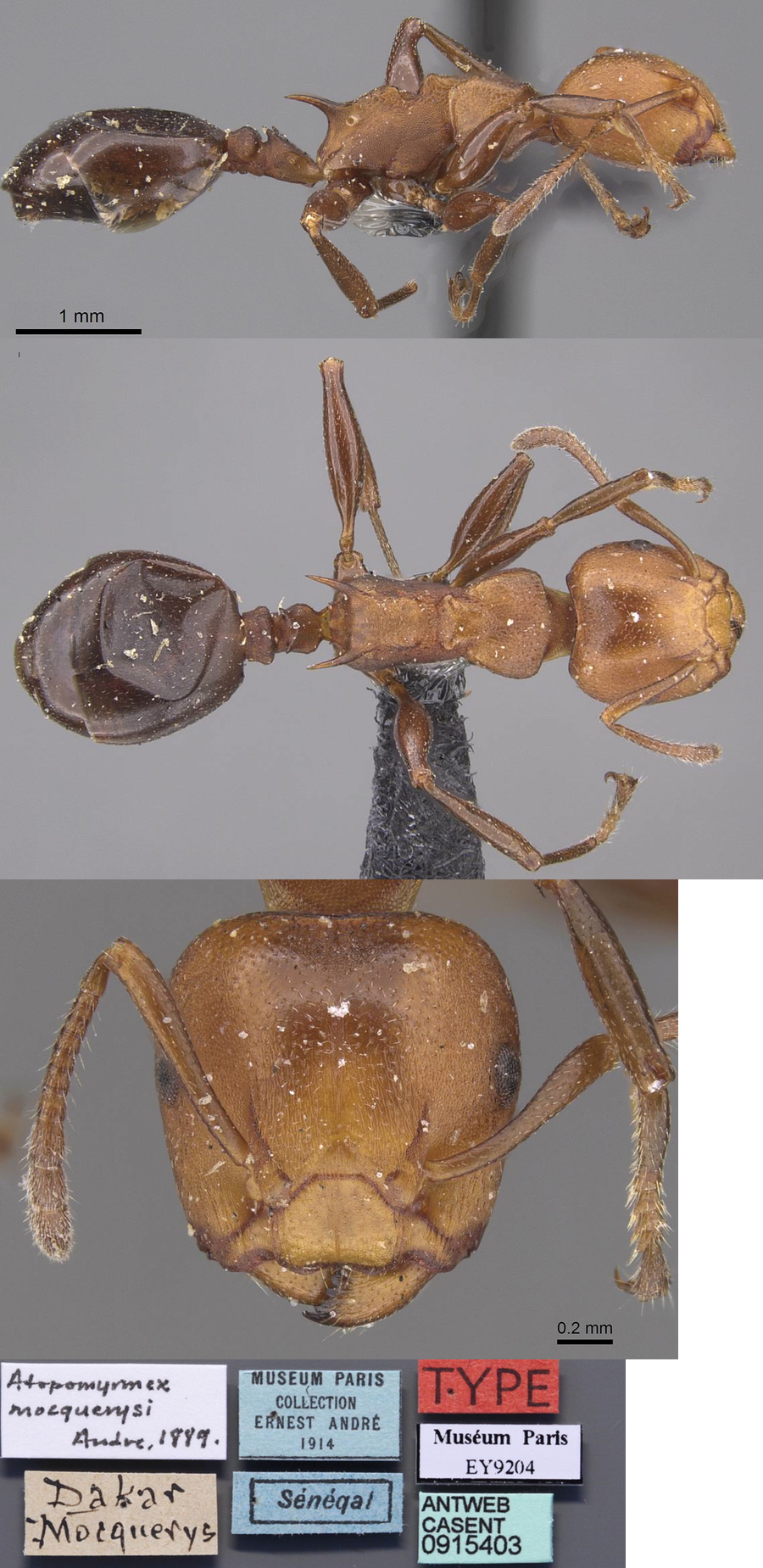 The
photomontage of a media worker from the type collection is collated
from http://www.antweb.org/specimen.do?name=casent0915403. The
photomontage of a media worker from the type collection is collated
from http://www.antweb.org/specimen.do?name=casent0915403.
|
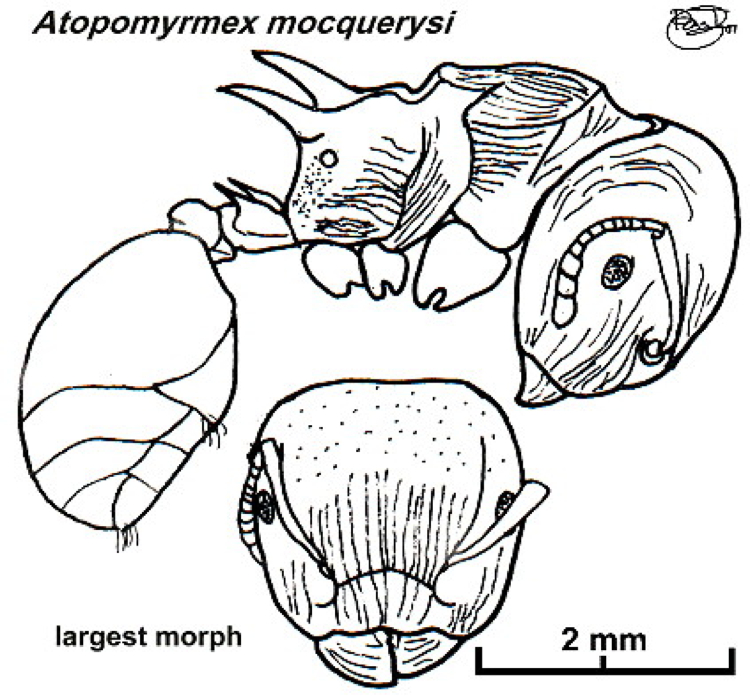 Nigeria
specimens (Taylor, 1980a: 3). WORKERS. TL
4.23-9.12 mm. Largest morph HL 2.15, HW 2.27, SL 1.18, PW 1.43 Nigeria
specimens (Taylor, 1980a: 3). WORKERS. TL
4.23-9.12 mm. Largest morph HL 2.15, HW 2.27, SL 1.18, PW 1.43
Colour very dark brown-black overall on smallest morph, but largest
morph has an orange head, with the alitrunk darker and the remainder as
for the smallest morph. Sculpturation of smallest morph mainly
spiculate on the head and alitrunk, rugose on dorsum of alitrunk.
Largest morph with coarse rugae on the anterior of the head and
alitrunk, gaster very finely punctate. Propodeal spines of smallest
morph are flat and acute; of largest morph massive and upturned.
Petiole spines of smallest are short and acute; on largest morph
moderately long and acute.
|
|
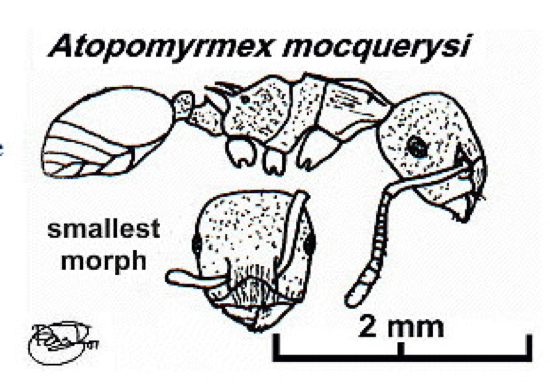 I found it at the
Cocoa Research Institute of Nigeria, Id
Ayunre, Block W22 on west edge vegetation, foraging in procession. I found it at the
Cocoa Research Institute of Nigeria, Id
Ayunre, Block W22 on west edge vegetation, foraging in procession.
|
A pan-African species, very widely distributed in wooded
and forested areas. Arboreal, nesting in wood of large trees. Forages
in columns on to adjacent trees, including cocoa, and shrubs.
Strickland (1951a) described it as essentially a West and Central
African species, although it also occurs in East and South Africa.
Wheeler (1922) also listed it from Benin (at Cotonou, F.
Silvestri) and the "Slave Coast" - eastern Nigeria - western Cameroun.
Bernard (1952) reported findings from Guinea,
Mt. Nimba area, several workers from Kéoulenta and N'Zo, noting that
the specimens were of the small dark variety "nigellus" known
from Congo.
|
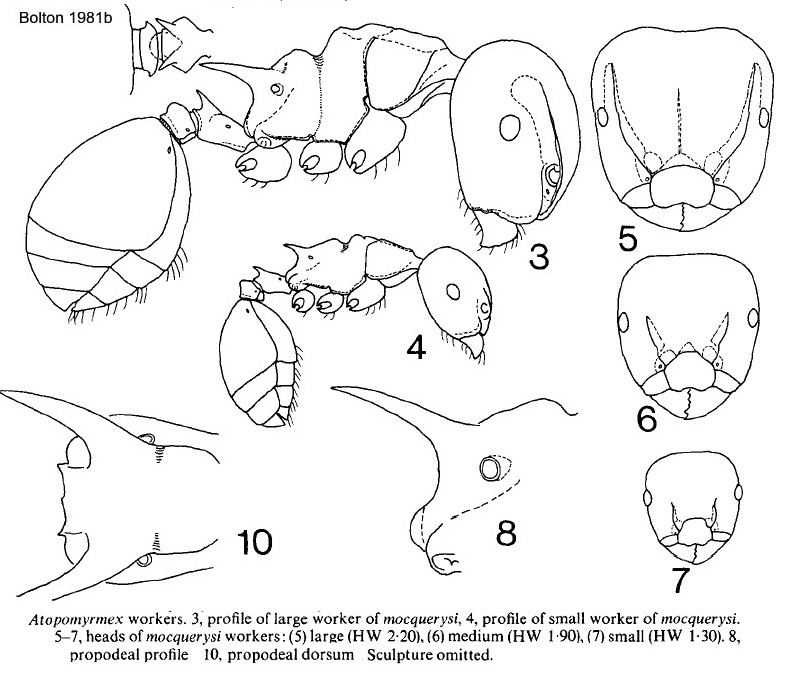 Uncommon
in Nigeria. Bolton (1981b, illustrated) lists CRIN (by himself)
and Mokwa, (by C. Longhurst). Adenuga & Adeboyeku (1987)
reported it attending mealybugs on cocoa. Uncommon
in Nigeria. Bolton (1981b, illustrated) lists CRIN (by himself)
and Mokwa, (by C. Longhurst). Adenuga & Adeboyeku (1987)
reported it attending mealybugs on cocoa.
Found in Ghana cocoa. Strickland (1951a)
described it as common locally in small areas (ca. 0.3 ha), very often
being associated with Crematogaster ants, although he felt the
association was due primarily to mocquerysi tending mealybugs.
At CRIG, Strickland recorded it in 36 collections, cf. 778 for Crematogaster
striatula. Leston (1973) described it as being of local importance
with nests in the hollow branches of tree crowns. Room (1971) found it
in fifteen of his collections from cocoa canopy and it features in his
consideration of the cocoa mosaic - as being negatively associated with
Camponotus niveosetosus (and by derivation with the
dominant Crematogaster clariventris) and positively associated
with Crematogaster striatula. Also from cocoa mistletoe (Room,
1975); and on cocoa at Kade, by Majer (1975). Two workers were
collected by pkd from the canopy of Amelonado cocoa at CRIG by Bigger
(1981a).
In Ivory Coast, before 1923, Lohier collected it
at Jacqueville, see above. The biology was studied at Lamto by Lévieux
(1976b), who gave the diet as being plant sap, seeds and predation on
arthropods; and the nest size as some 65,000 adults.
Bolton (1981b) has other findings from Cameroun,
at Nko'emvon (D. A. Jackson); and Benin, at Cotonou (F.
Silvestri, 1913, in Santschi, 1914d).
A specimen from Zaïre (Wheeler, 1922) shown in
Hölldobler & Wilson (1990, page 99) is crypteroceroides (as
above) and not mocquerysi.
|
Oxford University Museum
specimens
Atopomyrmex mocquerysi
B Taylor det. |
Ivory Coast
Erena Dupont
iii.2014
|
Taï National Park
5˚45'00" N
7˚07'00" W
|
16
|
2
|
 |
Atopomyrmex mocquerysi
B Taylor det. |
Benin
J-F Vayssieres
RVA 2879
|
31.x.2012
Calavi
06°25'17'' N
02°19'42'' E
|
On Mangifera indica
|
4
|
 |
Atopomyrmex mocquerysi
B Taylor det.
|
Congo
E Zassi
15-t-3-1
|
13-14.xi.2007
Lésio-Louna
03°16'24.8" S
015°28'08.2" E
|
Gallery Forest; 24h
pitfall trap |
1
|
 |
Atopomyrmex mocquerysi
B Taylor det. |
Congo
Yves Braet
|
6.viii.2008
Lesio-Louna
3°27'80.4" S
15°46'54.5" E
|
on savannah grass |
4
|
 |
Atopomyrmex mocquerysi
B Taylor det.
|
Central African
Republic
P Annoyer
EW-02 |
06.ii.2005
Dzanga-Sangha
02°50’01.8" N
16°08’13.7" E
|
Camp 3; Lampe de 40
watts classique au camp : 19h-23h; ; 375m asl
|
1
|
 |
Atopomyrmex mocquerysi
B Taylor det. |
Central African
Republic
P Annoyer
Camp 1E
|
12-18.x.2008
Dzanga-Sangha
03°03'58.3" N
16°08'59.6" E
|
528 m; Camp 1E;
Ayous Barber ayous Camp controlor
|
1
|
 |
|
 The photomontage
is of a major from the Central
African Republic,
Camp 1; collector Philippe Annoyer (CAR Camp 1E). The photomontage
is of a major from the Central
African Republic,
Camp 1; collector Philippe Annoyer (CAR Camp 1E).
|
 The
photomontage is of a media worker from Congo, Réserve de
Lésio-Louna; collector Eric Zassi (pitfall trap 15, t 3.1). The
photomontage is of a media worker from Congo, Réserve de
Lésio-Louna; collector Eric Zassi (pitfall trap 15, t 3.1).
|
 The
photomontage is of a media specimen from the Central African
Republic, Dzanga-Sangha NP; Camp 3; collector Philippe Annoyer (CAR
Camp 3 EW). The
photomontage is of a media specimen from the Central African
Republic, Dzanga-Sangha NP; Camp 3; collector Philippe Annoyer (CAR
Camp 3 EW).
|
|